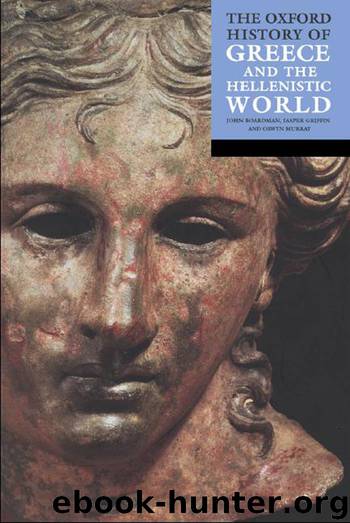The Oxford History Of Greece And The Hellenistic World by John Boardman & Jasper Griffin & Oswyn Murray

Author:John Boardman & Jasper Griffin & Oswyn Murray [Boardman, John & Griffin, Jasper & Murray, Oswyn]
Language: eng
Format: epub
Publisher: Oxford University Press
Published: 1986-08-02T23:00:00+00:00
Family
The Greek family was monogamous and nuclear, being composed in essence of husband and wife with their children; but Greek writers tend to equate it with the household as an economic unit, and therefore to regard other dependent relatives and slaves as part of it. The family fulfilled a number of social functions apart from the economic. It was the source of new citizens; in the classical period the state intervened to establish increasingly stringent rules for citizenship and so for legitimacy: ultimately a citizen must be the offspring of a legally recognized marriage between two Athenian citizens, whose parents must also be citizens; this increasingly sharp definition tended to exclude the more flexible unions of an earlier period. It became impossible for an Athenian to marry a foreigner or to obtain recognition for the children of any other type of liaison: the development is essentially democratic, the imposition of the social norms of the peasant majority on an aristocracy which had previously behaved very differently; for the aristocracy had often married outside the community and thereby determined its own criteria for legitimacy. Indeed Pericles, the author of the first of these citizenship laws, demonstrates the painfulness of the process of adaptation; for, when his legitimate children died of the plague, he was forced to seek from the assembly permission for his children by Aspasia, his Milesian mistress, to be declared legitimate Athenian citizens. Other individuals, often of aristocratic birth, found themselves reclassified in this process as bastards, without either citizenship or rights of inheritance.
For a second function of the family, intimately connected with citizenship, was the inheritance of property. Greek society in general did not practise primogeniture, the right of the eldest son to inherit; rather the property was divided equally by lot between all surviving sons, so that the traditional word for an inheritance was a man’s klēros or lot. This is one important reason for the instability of the Athenian family, for each family survived only as long as its head, and its property was redistributed on his death. There were of course countervailing tendencies. The common practice of burial in family plots gave a focus for a group of families over several generations, at least among those able to afford the considerable expense of the land and the impressive monuments which were a feature of these group burials: the phenomenon is perhaps a case of the wealthier citizens imitating aristocratic practices. Marriage, even at the highest levels, was endogamous, within a close circle of relatives, in order to preserve family property from fragmentation. More generally, for the same reason, it was common to limit family size; and that could often lead to the absence of male heirs through death, and the redistribution of the property among the wider group of relatives, who also had duties to prosecute a man’s murderer. But in general there is little evidence for extended family groups being important in the classical age.
Another function of the family raises one of the central
Download
This site does not store any files on its server. We only index and link to content provided by other sites. Please contact the content providers to delete copyright contents if any and email us, we'll remove relevant links or contents immediately.
| Africa | Americas |
| Arctic & Antarctica | Asia |
| Australia & Oceania | Europe |
| Middle East | Russia |
| United States | World |
| Ancient Civilizations | Military |
| Historical Study & Educational Resources |
The Daily Stoic by Holiday Ryan & Hanselman Stephen(3304)
The Fate of Rome: Climate, Disease, and the End of an Empire (The Princeton History of the Ancient World) by Kyle Harper(3060)
People of the Earth: An Introduction to World Prehistory by Dr. Brian Fagan & Nadia Durrani(2733)
Ancient Worlds by Michael Scott(2682)
Babylon's Ark by Lawrence Anthony(2673)
The Daily Stoic by Ryan Holiday & Stephen Hanselman(2572)
Foreign Devils on the Silk Road: The Search for the Lost Treasures of Central Asia by Peter Hopkirk(2463)
India's Ancient Past by R.S. Sharma(2451)
MOSES THE EGYPTIAN by Jan Assmann(2412)
The Complete Dead Sea Scrolls in English (7th Edition) (Penguin Classics) by Geza Vermes(2277)
The Earth Chronicles Handbook by Zecharia Sitchin(2227)
Lost Technologies of Ancient Egypt by Christopher Dunn(2224)
24 Hours in Ancient Rome by Philip Matyszak(2078)
Alexander the Great by Philip Freeman(2065)
Aztec by Gary Jennings(2023)
The Nine Waves of Creation by Carl Johan Calleman(1916)
Curse Tablets and Binding Spells from the Ancient World by Gager John G.;(1860)
Before Atlantis by Frank Joseph(1849)
Earthmare: The Lost Book of Wars by Cergat(1825)
